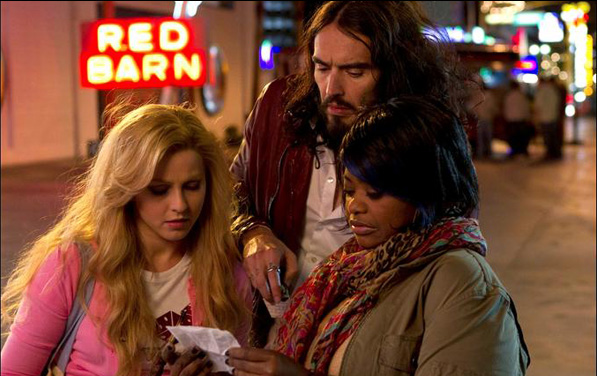Despite the perception of being an overnight success, Diablo Cody hasn’t necessarily been served well by first impressions. After becoming a screenwriting superstar with “Juno,” a film so charming and uplifting it’s easy to forget it’s ultimately about a young teen giving up her child, Cody was cast as a queen of quirk with a big heart and always at the ready with a pop culture-inflected quip. And while all of her output since has featured those trademarks to a degree, Cody’s work has drifted far more to the dark than the light in films such as “Jennifer’s Body” or “Young Adult” and her TV series “United States of Tara,” in a way living out the central theme of her work as a woman who defies the expectations set out for her for better or worse.
Not surprisingly, the initial release of Cody’s directorial debut “Paradise” is also not the best indicator of its quality, quietly debuting on DirecTV two months before opening in theaters after avoiding a big festival premiere and a splashy distribution deal that would seem to be its fate given Cody’s notoriety. Still, watching it on Channel 129 in the netherlands of the satellite service’s entertainment options seemed somewhat appropriate for a film that’s both nowhere near the disaster its stealth release implies or a recapturing of the “Juno” magic that its producers were likely hoping for. Instead, “Paradise” is a well-meaning, mostly satisfactory effort that shows flashes of the linguistic backflips and deep humanity that Cody is known for while not quite being sharp enough to be truly affecting.
We first meet its main character Lamb Mannerheim (Julianne Hough) in Montana after a plane crash has left a majority of her body covered in skin grafts. A 21-year-old from a family of Bible thumpers whose future seemed as bright as her flaxen locks so long as she stayed within her small conservative town, she’s only now seeing the light after her belief of God has come into question and decides to use some of the money she’s won in a settlement with the plane manufacturer to travel to Vegas and indulge in all that had previously been forbidden for her. There she finds a bartender (Russell Brand) and a lounge singer (Octavia Spencer) who help guide her through an evening of sin, though the activities they have in store won’t leave her with a tiger and Mike Tyson in the morning, but more likely something a single Aspirin would cure.
Still, that’s where the central headache of “Paradise” emerges from since the film never feels dangerous despite Cody’s clear desire to be edgy. Even though depicting Las Vegas in its pedestrian actuality may be the point as an ill-conceived haven for Lamb, it doesn’t square with the heightened reality the characters exist in or give way to the comic setups that the film hints at but never capitalizes on during its one not-so-crazy night. Lamb may be committing blasphemy by rhythmically bobbing in a club or getting the teeny tiniest of tattoos, but as the film wears on, freeze-framing every sin, the joke wears thin. Also, despite her jabs at every race and religion, Lamb never seems like an inveterate xenophobe, warming quickly Brand and Spencer’s William and Loray and somehow has an iPod full of indie rock bands you’d imagine she’d never know of from her sheltered existence back home.
However, what “Paradise” lacks in spice, it makes up for to some degree in depth, with Lamb as interesting a starting point for a character as Cody has ever devised. Uncomfortable in her own skin, imagining herself with the same appearance as when she was engulfed by flames when in reality she doesn’t look much different from before, there is a real conflict to be mined as Loray and William try to bring Lamb out of her shell and religious beliefs that were so deeply ingrained in Lamb growing up begin to mingle with the common sense her newfound friends provide.
Superficially, the fresh-faced Hough is ideally suited for the part and though she lacks even the slightest bit of guile to convincingly portray the bitterness of character such as Lamb the way Charlize Theron did when she had a field day in “Young Adult,” she does allow you to empathize with her and holds her own against Brand and Spencer, who are notably dialed down here and get full-bodied characters of their own. While Brand gets a chance to play the streetwise big brother-type that made him so endearing in his American debut in “Forgetting Sarah Marshall,” Spencer finds a similarly unique opportunity in Loray, whose small-time singing career is only intended to put her through film school, inspiring an amusing self-reflexive explanation of the cinematic conceit of “the magical negro.”

Yet what’s truly unfortunate about “Paradise” is that, flawed as it is, there isn’t a bigger place at the market for it. Cody remains a singular voice for complex characters we don’t often see onscreen, steadfast and smart, if usually way out of their depth. With each succeeding film, she seems intent on pushing audiences further from their comfort zone – here unlikely to please either secular or religious audiences with the idea that each could learn from one another – and ultimately pushing bigger distributors away since there’s not as much of her sizzling sarcasm to sell. In “Paradise,” she once again proves that she may not be great at first impressions, but quite capable of lasting ones and as much as I’m looking forward to the next film she writes, I hope she’s gets another chance behind the camera as well.
“Paradise” is currently available exclusively on DirecTV. It will open in theaters on October 18th.




